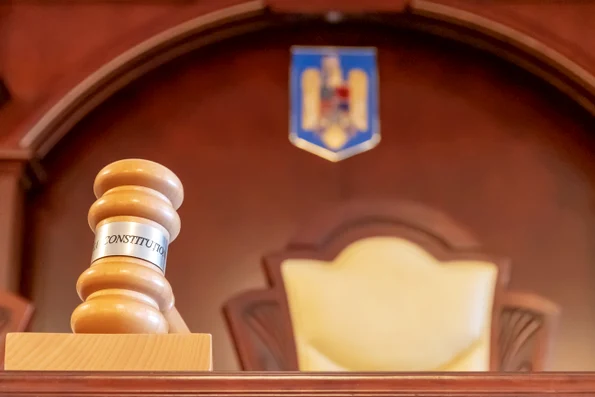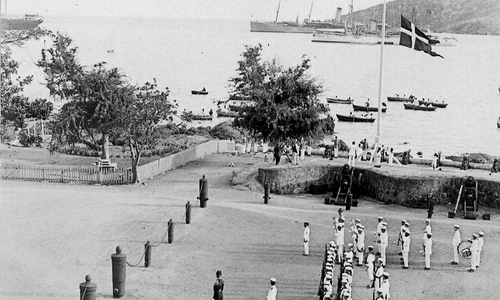
Historic interview: The position of the president of the Constitutional Court of Romania/CCR shatters fake news ideas regarding elections
Marian Enache, the president of the Romanian Constitutional Court tried, in a complex interview published today on the juridice.ro platform, to explain the decision of the CCR to annul the presidential elections in Romania and to dismantle fake news which has resided for weeks in the public space, using a clear way of expression for those not used to the subtlety of the specialized legal language, which usually makes references to internal laws and international conventions.
The entire interview can be accessed here:Fake news: The CCR decision to annul the presidential elections was based on classified information and sufficient evidence was not provided to prove otherwise. Details hereReality: the Court does not directly verify evidence submitted by the challenger, instead orders the state authorities to convey necessary information to ensure that the election process was done in the legal and constitutional parameters. Otherwise, in the hypothesis in which the Court decides to take action itself, it means that there is an extraordinary situation in which the competent state authorities already signaled the existence, on a certain degree, of a violation of the electoral law. In this case, the Constitutional Court will evaluate whether these violations have a level of severity which determine the cancelling of the election of the president of Romania. Therefore, Marian Enache shows that, when it comes to evaluating the constitutionality of the electoral process, meaning the guarantee of the right and free character of the election, the Constitutional Court makes a decision based on official information coming from specialized authorities, which supply these directly or through the official channels in the public space. The documents which contain the information/data have the presumption of legality and truth, and it is not the competence of the Court to remove them, nor is the Court tasked to share the information with the electoral competitors. In other words, the Court cannot challenge the facts discovered by the specialized public authorities which have an effect on the electoral process, but has the means to decide whether such found violations are serious enough to cancel the election of the Romanian president. Taking a closer look to the annulment of the presidential elections in Romania, Marian Enache stated that the CSAT (Supreme Council of National Defense) was the authority that concluded that there was interference in the unfolding of the presidential election in a press release, which synthesized the information received through briefing papers issued by the state security services, which were declassified. Consequently, according to Marian Enache, the decision of the CCR is not based on classified information, and so, when it comes to us, the 59th and 77th paragraph of the report draft issued by the Venice Commission (which refers to the impossibility to annul elections based on classified information) has no consequence regarding the decision of the Constitutional Court to cancel the electoral process. According to this, any other opinion is counterfactual and lacks any real basis. In his opinion, the fact that those who caused this prejudice are not yet discovered does not mean that the prejudice does not exist and must be therefore ignored or underestimated. In a lawful state, according to the president of CCR, we must begin with the principle of legality and veracity of the documents issued by the state institutions. Thus, in the case of an abstract electoral dispute, these declassified documents shaped the unanimously shared belief, of the constitutional judges, that the electoral process was corrupted in such a way that the results of the vote and the order of the candidates were affected substantially. The vote of each judge respected their independence, and the cancelation of the electoral process was pronounced unanimously. In this decision, the CCR judges took into account that the Court has the obligation, stated in the Constitution, to protect the constitutional order when they find that there is a corrupted electoral process to choose the President of Romania, which is capable to affect the legality and fairness of the results of the votes cast by the citizens, the Court being tasked to prevent a situation where an electoral competitor might be sworn in as president of Romania following a corrupted electoral process. Fake news: the CCR decision canceled the voting right of the citizensReality: the CCR decision does not sanction or cancel the voting right of the citizens, but it protects it from any interference to cast it freely and to achieve its constitutional finality. By cancelling the electoral process regarding the election of the President of Romania, the Constitutional Court took a preventive constitutional measure of justice. The Court sanctioned, within its constitutional limits, the electoral process, which was unfolding in a state of incorrectness, based on official documents from the institutions which, by law, are tasked with protecting the national security and which showed that there were major irregularities in the electoral process. Marian Enache believes that, there could only be one rational and constitutional solution: the annulment of the electoral process for the election of the President of Romania to sanction the corrupted electoral process on the one hand, and on the other, to provide all citizens the opportunity to take part in another fair electoral process, which has to respect the legal and constitutional rules. In the opinion of the president of CCR, the Court must show zero tolerance when it comes to any influence or interference which can lead to the distortion of the election results, this being the only way to guarantee the freedom of the citizen to choose freely and correctly. In the case of Romania, the irregularities which determined the cancelation of the electoral process to elect the President of Romania targeted the candidates equality of opportunity, the funding of the electoral campaign and the influence on the vote, all in all the fairness of the election as an expression of sovereignty.Particularly, according to Marian Enache, the Court found that in the process of electing the President of Romania, two fundamental and interrelated rights - the right to vote and the right to be elected - were compromised due to the conduct of one of the candidates, which demonstrated that the elections failed to meet the constitutional requirements that are the very foundation of a democratic state. A flawed electoral procedure in its essential aspects - and here I am referring to the requirement of fairness in elections, also known as “clean elections” – cannot be considered partially valid. Such violations are irreparable and affect the process as a whole. Overall, it is precisely the disinformation campaign and social media actions to falsely promote Călin Georgescu which affected the constitutional right to vote.Marian Enache underlines that the entire draft report should be understood in a unified manner and in direct relation to the need for the member states of the Council of Europe to establish legislative rules for conducting electoral campaigns in the sphere of social media. It is undeniable that, unlike traditional electoral campaign channels, which are strictly regulated both in terms of freedom of expression and financial fairness and transparency, the new wave of social media remains a “terra incognita” for governments, requiring legislators to systematically and appropriately regulate this domain. In his view, establishing legal rules regarding the operation of digital social media platforms and ensuring the transparency of the algorithms used is becoming imperative for lawmakers in order for them to protect the right to vote and the right to run for office – both intrinsic elements of constitutional democracy – from potential interferences and deceptive manipulations of the electoral process itself.
Fake news: the draft of the Report of the Venice Commission of January 27th is about the CCR decision to annul the presidential elections.Reality: Marian Enache shows, that first of all, the Venice Commission is a consultative organism of the European Council, made of people named by the governments of member states of the Council of Europe, the examination of cases solved at national courts not being their area of activity.Regarding the mentioned draft of the report, Marian Enache upholds that it very clearly specifies that it is the competence of constitutional courts to annul ex officio the elections in extraordinary situations – which is correct from the perspective of protecting the rule of law – however, it regrettably fails to separate presidential elections and other types of elections. As an example, the report mistakenly mentions the First Additional Protocol to the Convention for the Protection of Human Rights and Fundamental Freedoms – which applies only to parliamentary elections – when analyzing presidential elections, because this protocol does not apply to such elections. It can be observed that, in 2016, the Austrian Constitutional Court invalidated the results of the second round of the presidential elections, applying a very strict standard regarding the enforcement of electoral rules and principles. Although no evidence of manipulated vote counting was found – meaning no electoral fraud was identified – the Austrian Constitutional Court determined that irregularities in the management and counting of postal votes could have affected almost 78,000 votes out of the 117 electoral districts, given that the difference between the two candidates was approximately 31,000 votes. According to Marian Enache, the draft report propagated in the public space the erroneous idea that the Venice Commission is an electoral judge superior to the ones in Romania.
At the same time, according to Marian Enache, the Constitutional Court has the constitutional obligation and responsibility to monitor the unfolding of the presidential elections – the free and fair character of the process. The Constitutional Court decisions are not against or in favor of a candidate, they are adopted in the interpretation and application of the Constitution. According to Marian Enache, any electoral operation that falls within the presidential elections can be reviewed by the Court, and documents of the Central Electoral Bureau can be challenged before the Court. This aspect is in accordance with the Venice Commission’s draft report (paragraph 21), which, in the case of the election annulment, states that this competence may belong either to an administrative body – provided its documents can be challenged before the Supreme Court, the Constitutional Court or some other specialized electoral courts, or to the constitutional court as a first and last instance – as is the case of Romania. According to Marian Enache, if a constitutional court cand validate and confirm the election results, it also means that it can reject, invalidate or annul them. This power cannot pe a formal, decorative or declarative one, it is real and effective, and can be exercised when an extraordinary situation triggers it.
However, in reality, this draft report is a consultative documentary initiative with a general recommendation, which does not address the specific situation in Romania and obviously, does not challenge the decisions of the CCR. Moreover, it admits that international standards do not impose or contradict, in principle, the ex officio intervention of the constitutional courts in electoral matters.
According to Marian Enache, this draft report is a wake-up call for national lawmakers, which have to identify and regulate the unfolding of the electoral campaign, taking into account the risks and particularities of social media campaigns conducted online or on any other digital platforms, which can pe fraudulently sponsored and financially supported by legal entities from inside or outside the country borders, which can be difficult to identify. In his view, these regulations, both at European level as well as at national level are an urgent matter of public interest and have to quickly be adopted.
Fake news: the CCR sanctioned one of the candidates for its freedom of expressionReality: Marian Enache pointed out that both the Constitution of Romania and the jurisprudence of the Constitutional Court fully guarantee freedom of expression, but not in absolute terms, for all citizens of Romania. Freedom of expression is inherently limited by law when it promotes xenophobic, anti-Semitic, Legionnaire, Nazi, totalitarian ideas, or national hatred, incitement to discrimination, public violence, and defamation of the values of the democratic system and the constitutional order.Marian Enache upholds that the CCR takes into account previous court convictions in criminal matters concerning the candidates, but this is not an exclusive condition in a constitutional dispute, as the court conducts its own evaluation in the sphere of constitutionality. Thus, even in the absence of a prior court conviction, the constitutional court may determine that a candidate does not meet the constitutional eligibility requirements, which are distinct from strict legal requirements.Fake news: the decision to annul the elections was not just/fair, because the first round of elections was validated, and, several days later, the entire election was canceled
Reality: following the first round of presidential elections, the CCR was notified, in accordance with the law on the election of the President of Romania, with two request to annul the elections, submitted by two candidates. One was rejected because it was filed after the deadline. Following the analysis of the second one, the Court unanimously decided that, in light of all the contested aspect, the ballots had to be recounted to eliminate any doubt regarding the results of the first round of voting, ensuring this way the necessary transparency in determining the outcome of the electoral process.
As such, Marian Enache argued that faced with a request submitted by a presidential candidate within the legal framework and timeframe, the Court ordered the recounting of the ballots. Following the recount of the ballots in the country, the CCR found that the arguments invoked by the contestant were not justified, the only possible and mandatory solution at that moment, also taking into account the timeframe in which the ruling had to be issued, was to validate the results of the first round of elections in accordance with article 146, letter f), second clause of the Constitution. According to Marian Enache, subsequent to this validation, the reports of the security services presented in the CSAT meeting were declassified. In light of these documents and the realities recorded in the – the documents being accessible to all citizen and institutions in this country, the Court exercised its mandatory constitutional power, provided in article 146, letter f), first clause of the Constitution, and annulled the electoral process regarding the election of the President of Romania, in accordance to the constitutional provisions.
Thus, the Court did not revise its decision to validate the results of the first round of the presidential elections. The institution of revision is not applicable in the constitutional procedure, and the possibility of an errata is excluded, given that it targeted the correction of a material error in a decision and not the replacement or amendment of a solution issued by a jurisdictional authority.
Fake news: the statements of US vice-presidents JD Vance, according to which the elections in Romania were canceled “based on the flimsy suspicions of an intelligence agency and at the enormous pressure from its continental neighbors”, and “if a democracy can be destroyed with a few thousand dollars of digital advertising from a foreign country, then it wasn’t very strong to begin with” are indirectly criticizing the CCR decision to annul the elections
Reality: According to Marian Enache, JD Vance refers to the fact that the annulment of the electoral process was the consequence of a weak democratic society and he does state that, in issuing such a decision, the Romanian Constitutional Court overstepped its boundaries. Marian Enache believes that the message is being relayed to the entire European society, highlighting that democracy and rule of law must be strengthened in order to defend the citizens and the fundamental values shared at international level. In this context, the fairness and transparency of elections are central values of democratic voting, which must be upheld by the state, the voting citizen and the candidates alike. Achieving these standards can only be accomplished through the promotion of a genuine dialogue, free from preconceived opinions. The annulment of the electoral process is not solely a matter for the Constitutional Court but a matter for society as a whole, as it serves as an indicator of how democracy functions within that society.
Through its decisions, the Constitutional Court has sounded the alarm in this regard by activating the “red code,” but it has not resolved the underlying issue of the state of Romanian democracy, because understanding the premises for the occurrence of such effects must be a concern and responsibility of the collective social consciousness, not just of state institutions. This is also the way international officials also use, by which they “warn us”, being right in doing so, that the annulment of an electoral process is caused by the fact that we don’t have a strong democracy or strong and consolidated institutions which can prevent intrusions in the political and constitutional system of the country. Following these pertinent observations, per a contrario, there is a need for both societal awareness of the existing risks and vulnerabilities and for effective measures and decisions by specialized institutions to protect the rule of law and functional democracy in line with the requirements arising from Romania’s status as a member state of Euro-Atlantic structures.
According to Marian Enache, one of the fundamental principles of international law is that of state sovereignty and the respect due to it, and the electoral system and the organization of elections are, by their very nature, domains reserved for the state and a condition of its sovereignty. The Constitution establishes that sovereignty belongs to the Romanian people, who exercise it through their representative bodies, constituted by free, periodic, and fair elections, as well as through referenda. An electoral process that has been diverted from its democratic purpose through the proliferation of large-scale disinformation has prevented the state and public authorities from organizing democratic elections, thereby affecting the institutional capacity of the state itself. Disinformation can, however, influence the electorate in order to achieve a certain outcome through their vote. The corruption of the electoral process requires the legal intervention of public authorities with jurisdiction in the field to restore legality and constitutionality. Consequently, from the perspective of international law, the decision of the Constitutional Court is not only correct but also legitimate, as it was issued in relation to the core of the Constitution – namely, the protection of state sovereignty in the face of hybrid threats against it.
Also, in the view of the CCR president, a healthy political system and democracy must be governed by the rule of law, not by the law of force – only in this way can we speak of strengthening democracy, respecting the rule of law, and ensuring the existence of a robust democracy that is resilient to any internal and external threats. Despite the principled nature and clarity of the U.S.















